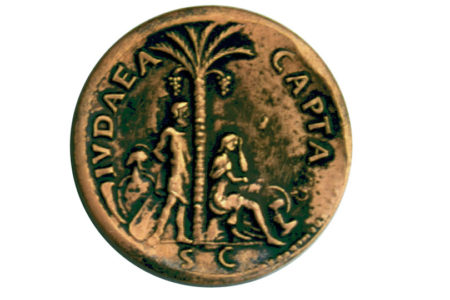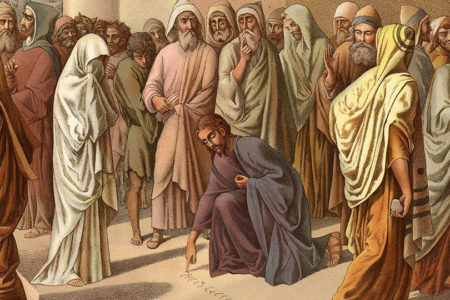The Witness of Scripture Concerning Its Inspiration Part Four
The previous article in this series presented the witness of the Old Testament and Jesus Christ concerning the divine nature of the Old Testament. This article examines the testimony of Jesus Christ and the apostles concerning the divine nature of the New Testament.
Christ’s Witness Concerning the Divine Nature of the New Testament
Jesus’ Promise of the Spirit
The night before He was crucified, Jesus informed His apostles of something that disturbed them greatly. In a little while He would leave them to return to His Father’s house in heaven (Jn. 13:33–14:2).
Jesus relieved the apostles’ fears by promising that they would not be abandoned like orphans during His absence. God the Father would give them another Comforter—the Holy Spirit—to replace Jesus’ presence with them (Jn. 14:16–17).
Christ’s comments indicated that after His return to the Father in heaven, the Holy Spirit would be related to the apostles in a way in which He had not been related to them before (Jn. 14:17). On the day of His ascension, Jesus told the apostles that this new relationship with the Holy Spirit would begin in Jerusalem “not many days from now” (Acts 1:1–8). It began ten days later on the Day of Pentecost (Acts 2:1–4).
John 14:26: Activities of the Spirit
On the night before His crucifixion, Jesus foretold various ways in which the Holy Spirit would be involved with the apostles. Among those ways was the following: “But the Comforter, who is the Holy Spirit, whom the Father will send in my name, he shall teach you all things, and bring all things to your remembrance, whatever I have said unto you” (Jn. 14:26). This statement is extremely significant because it has two implications concerning the divine nature of the New Testament.
By this, Jesus indicated that everything He had taught the apostles before His ascension would be brought to their remembrance by the Holy Spirit after His ascension. This activity of the Holy Spirit has a tremendous implication concerning the divine nature of the New Testament. The Gospels of the New Testament profess to be the record of Jesus’ teaching that He gave during His years of ministry with the apostles. Two of the Gospels—Matthew and John—were written by two of Jesus’ apostles. Neither of these Gospels was written until several decades after Jesus’ ascension. Thus, they profess to record teaching given by Jesus many years earlier. Because human beings quickly forget and often have faulty memories of things they have been taught, on what basis can we trust the accuracy and reliability of these Gospel accounts of Jesus’ teaching?
Jesus Himself revealed the basis of that truth. He indicated that after His ascension, the Holy Spirit would bring to the apostles’ remembrance “all things” that He had taught them during His years of ministry with them. He was telling them that the Holy Spirit would play a significant role in the apostles’ oral and written accounts of Jesus’ teaching, working supernaturally with those men to produce accurate, reliable documents. Thus, before any of the New Testament was written, Jesus bore witness in advance to the divine nature of the Gospels of Matthew and John.
The other implication is contained in the Lord’s declaration that the Holy Spirit “shall teach you all things.” This indicated that the teaching He had already given the apostles before His ascension was not complete. Much more truth was to be taught to the apostles for the benefit of the church, but the Holy Spirit would communicate it to them after Christ’s ascension.
Christ stated that the Holy Spirit would teach these men “all things,” not just some things. Because Jesus declared this to the apostles who had been with Him during His years of earthly ministry, and because they were His apostles to the church (1 Cor. 12:28; Eph. 4:11–12), He thereby indicated that all the teaching He wanted the church to have would come during the corporate lifetime of the apostles.
This does not mean that they were the only ones to whom additional teaching would be communicated by the Spirit for the benefit of the church. Paul was neither saved nor an apostle when Jesus stated this. Once Paul became an apostle, he received teaching through the Spirit, as did New Testament prophets (1 Cor. 2:6–13; Eph. 3:2–5). But it does mean that before the last of them died, the corporate body of apostles who had been with Christ before His ascension would receive all of the teaching that He wanted the church to have. It is no accident, then, that John, the last of the apostles to die, wrote the last book of the New Testament just a few years before his death. Revelation is the capstone of all the teaching that Christ had for the church.
This activity of the Holy Spirit—teaching “all things” to the apostles—has an important implication concerning the divine nature of the New Testament. That additional teaching was recorded by the apostles and New Testament prophets in the epistles and Revelation. Thus, when Jesus declared this future activity of the Holy Spirit, He was indicating that the Spirit would be the ultimate source or author of those books of the New Testament. Before any of the New Testament was written, Jesus thereby witnessed concerning the divine nature of the epistles and Revelation.
John 16:13: Activities of the Spirit
On the night before His crucifixion, Jesus once again foretold ways in which the Holy Spirit would be involved with the apostles after His ascension. He told them, “I have yet many things to say unto you, but ye cannot bear them now” (Jn. 16:12). Apparently the teaching He had already given them had brought them to the saturation point. This condition posed a problem. Because He had told them that He would be leaving them shortly, how would they obtain the additional knowledge He wanted them to have?
Jesus presented the solution to this problem when He declared, “Nevertheless, when he, the Spirit of truth, is come, he will guide you into all truth; for he shall not speak of himself, but whatever he shall hear, that shall he speak; and he will show you things to come” (Jn. 16:13).
In the first part of this declaration, Jesus asserted that the Holy Spirit would guide His apostles into “all the truth” (literal translation), not just some of it. Thus, once again the Lord was indicating that during the corporate lifetime of the apostles who had been with Him during His earthly ministry, all of the additional truth He wanted the church to have would be delivered to them by the Spirit.
Jesus also stated that the Holy Spirit would show the apostles “things to come” (future events). Prophecies concerning the future were recorded in some of the epistles and in most of Revelation.
The Apostles’ Witness Concerning the Divine Nature of the New Testament
The Apostle Paul’s Witness
Paul witnessed concerning the divine nature of the New Testament in 1 Corinthians 2:13. In verse 10 he referred to things that God had revealed to the apostles and New Testament prophets by the Holy Spirit (cp. Eph. 3:5, where Paul talked about knowledge “Which in other ages was not made known unto the sons of men, as it is now revealed unto his holy apostles and prophets by the Spirit”).
In verse 13 Paul explained what happened when the apostles and New Testament prophets communicated this Spirit-revealed knowledge: “Which things also we speak, not in the words which man’s wisdom teacheth, but which the Holy Spirit teacheth, comparing spiritual things with spiritual.” The word translated comparing also means “combine” (Arndt and Gingrich, A Greek-English Lexicon of the New Testament, p. 782). The first word translated spiritual “can denote the content of the knowledge given by God’s Spirit” (Eduard Schweizer, Theological Dictionary of the New Testament, VI, p. 437).
Paul was saying that when the apostles and New Testament prophets communicated the knowledge revealed to them by the Holy Spirit, the Spirit worked with them supernaturally, enabling them to combine the Spirit-revealed thoughts with Spirit-prompted words. In other words, their verbal communication of God’s revelation was divinely inspired; even the words were inspired by the Spirit. This was necessary if their communication was to be accurate
Because the apostles and New Testament prophets communicated God’s revelation—not only orally but sometimes in written form—this activity of the Spirit took place when they wrote the books of the New Testament. Thus, in his 1 Corinthians 2:13 statement, Paul was claiming divine inspiration for the words of those books and thereby was witnessing concerning the divine nature of the New Testament. This passage is a significant basis for the concept of verbal inspiration.
In 1 Corinthians 14:37 Paul asserted, “the things that I write unto you are the commandments of the Lord,” thereby indicating that God was the ultimate source or author of what he wrote in 1 Corinthians. This was his witness for the divine nature of the book.
The Apostle Peter’s Witness
Peter claimed that when Paul wrote his epistles, he recorded “the wisdom given unto him” (2 Pet. 3:15). He thereby indicated that Paul was not the ultimate source or author of his epistles.
Peter referred to certain people who abused Paul’s epistles, “as they do also the other scriptures, unto their own destruction” (2 Pet. 3:16). Through this statement, Peter put Paul’s epistles in the category of Scripture. Because the apostles applied the term Scriptures exclusively to divinely inspired writings (2 Tim. 3:16), Peter thereby claimed divine inspiration for Paul’s epistles. His assertion that abuse of Paul epistles would bring destruction indicated that those New Testament books were not just human writings.
Conclusion
Why is belief in the divine inspiration of the Bible important? One critical reason is, as noted in this and the previous article, that Jesus Christ believed and taught the divine inspiration of the Old and New Testaments. In light of this, denying the inspiration of the Bible is defaming the character and truthfulness of Jesus Christ. If He knowingly taught error on this subject, then He lied and thereby flawed His character. If He taught error because of personal ignorance on this subject, how can we be certain that He didn’t do the same thing on other subjects? Denial of the divine inspiration of the Bible prompts conclusions and questions such as these and thereby undermines the person and work of Jesus Christ.






